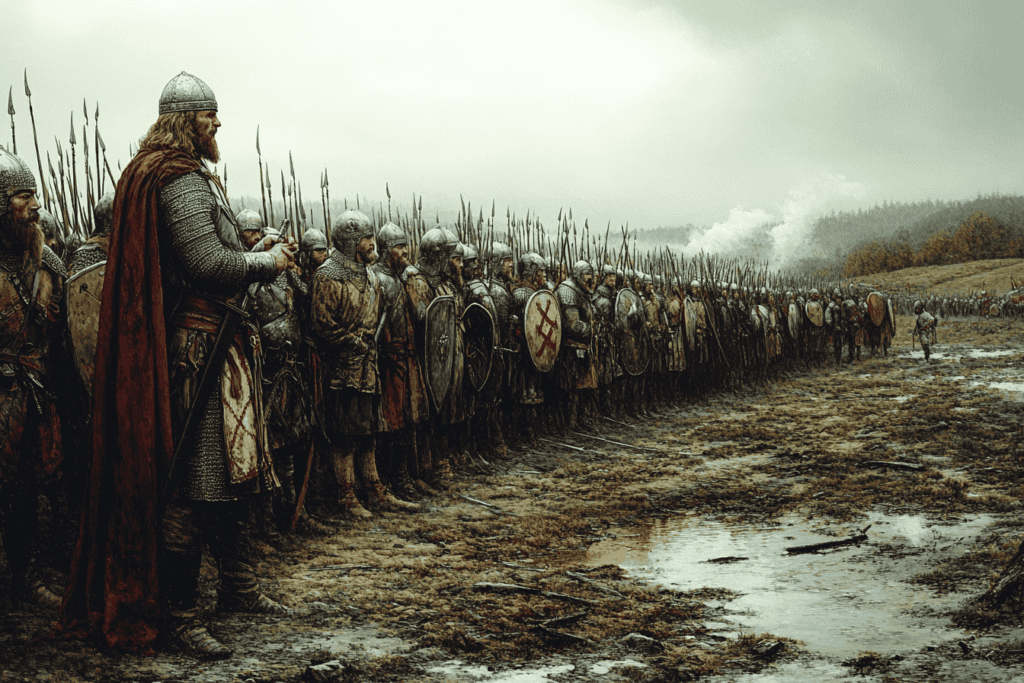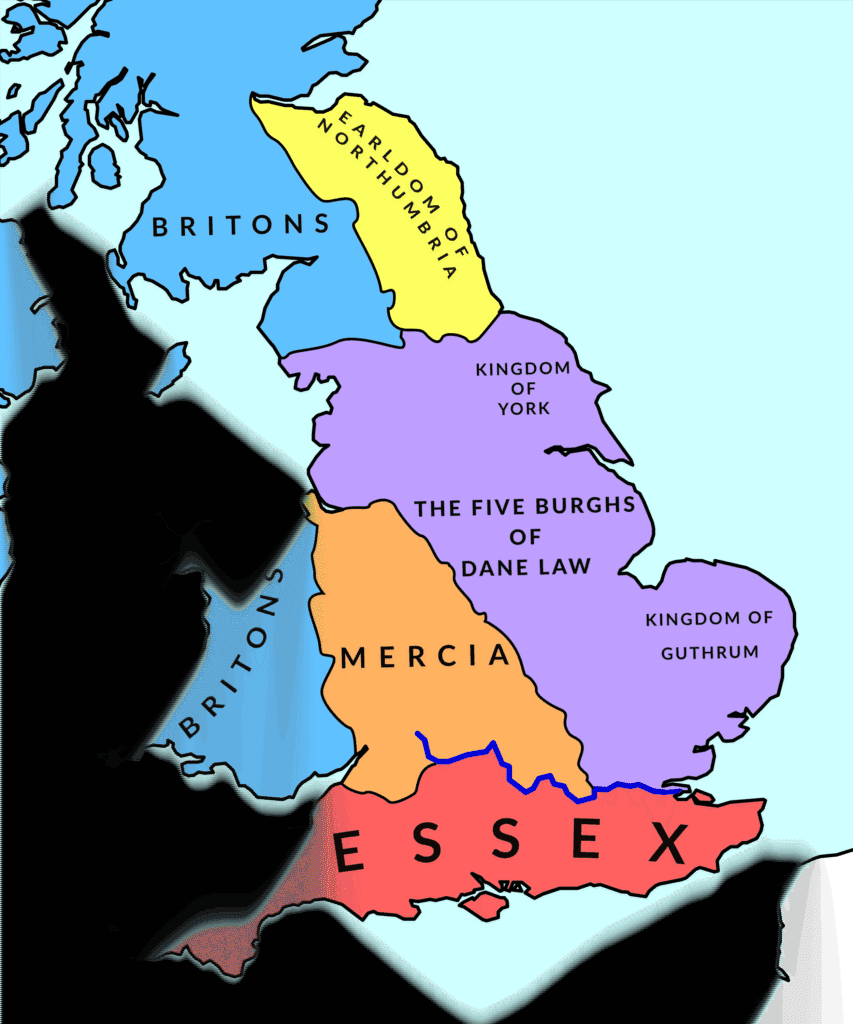
In the annals of English history, few figures loom as large as Alfred the Great. Born in 849 AD, Alfred would go on to become one of the most influential and revered monarchs in British history. His reign as King of Wessex and later King of the Anglo-Saxons was marked by military prowess, administrative innovation, and a passionate commitment to learning and culture. This is the story of the man who not only defended England against Viking invasions but also laid the foundations for a unified English nation.
Alfred was born in Wantage, Berkshire, the youngest son of King Æthelwulf of Wessex. As the fifth son, he was never expected to become king. However, fate had other plans for young Alfred. His early years were marked by two significant journeys to Rome, experiences that would shape his worldview and future policies.
The Viking Threat and Military Reforms
The political landscape of 9th-century England was fragmented and tumultuous. The island was divided into several Anglo-Saxon kingdoms, constantly under threat from Viking invasions. By the time Alfred came of age, his three elder brothers had all taken turns on the throne of Wessex, each facing increasing pressure from Danish invaders.
The year 865 marked a turning point in the Viking invasions. No longer content with mere raiding, a massive force known as the Great Heathen Army landed on English soil. Led by the legendary sons of Ragnar Lodbrok – Ivar the Boneless, Ubba, and Halfdan Ragnarsson – this army came not just to plunder, but to conquer and settle.

While the exact size of this force remains a mystery, modern estimates suggest it numbered between 500 and 1,000 men – a formidable army for its time. What set this army apart was its clear intent: conquest and settlement, rather than hit-and-run raids.
The Anglo-Saxon kingdoms fell like dominoes before the Viking onslaught. By 870, Northumbria and East Anglia had succumbed. The following year, Wessex became the target. In a single year, nine battles raged across the land, with only one victory for the West Saxons. It was in this crucible of fire that Alfred, soon to be called “the Great,” ascended to the throne of Wessex, following the death of his brother Ethelred at the Battle of Merton.
As the 870s progressed, the seemingly unstoppable Viking advance began to falter. The fall of Mercia in 874 paradoxically weakened the Great Army’s cohesion. Halfdan returned north to secure his holdings in Northumbria, while Guthrum led his forces to East Anglia.
Alfred, now King of Wessex, found himself locked in a deadly game of cat and mouse with Guthrum. The Danish leader launched several attacks on Wessex, nearly capturing Alfred in his winter fortress at Chippenham in 878, forcing him to retreat to the Somerset marshes of Athelney. From this natural fortress, he regrouped and sent messages out to all the shires to raise militias for the coming fighting season. When spring arrived, Alfred emerged from the marshes and took command of the fyrd, the Anglo-Saxon militia, and marched to confront Guthrum at Edington.

The clash at Edington was more than just a battle; it was a fight for the very soul of England. Alfred’s forces, driven by desperation and determination, formed an impenetrable shield wall against the Viking horde. The fighting was fierce and bloody, but in the end, Alfred’s larger force emerged victorious.
The defeated Danes fled to their fortress, where Alfred’s army besieged them. After two weeks of starvation, Guthrum sued for peace. But this was no ordinary treaty. Alfred demanded not only that the Vikings leave Wessex, but also that Guthrum himself convert to Christianity. This brilliant stroke of political maneuvering would have far-reaching consequences for the future of England.
Alfred’s triumph at Edington was a hugely significant moment in English history. It marked the beginning of the end for Viking dominance and laid the foundation for the eventual unification of England under Wessex rule. It led to the Treaty of Wedmore, which established a boundary between Alfred’s kingdom and the area controlled by the Danes, known as the Danelaw.

Alfred’s military successes were not just the result of battlefield prowess but also of significant reforms he implemented in Wessex’s defensive capabilities. He established a network of fortified towns or ‘burhs’ across his kingdom, which served as defensive strongholds and centers of trade and administration. This system, detailed in the Burghal Hidage, was a revolutionary approach to territorial defense.
Furthermore, Alfred reformed the fyrd, the Anglo-Saxon militia system, creating a standing army that could respond quickly to threats. He also invested in naval power, building ships to counter Viking sea raids and laying the foundation for the future English navy.
Administrative and Legal Reforms
Alfred’s genius extended beyond military matters. He implemented sweeping administrative reforms that strengthened the governance of his kingdom and laid the groundwork for a unified English state.
One of Alfred’s most significant innovations was the introduction of a new system of law. He compiled and codified existing laws, adding his own decrees to create a more comprehensive and consistent legal framework. Alfred’s law code was prefaced with excerpts from the Bible, reflecting his belief in the divine nature of kingship and the importance of Christian morality in governance.
Alfred also reformed the system of land ownership and taxation. He introduced the ‘hide’ system, where land productivity determined the tenant’s obligations to the community. This system helped ensure a fair distribution of military and financial responsibilities among his subjects.
In terms of administration, Alfred divided his kingdom into shires, each governed by an ealdorman. This system of local government would prove to be long-lasting, forming the basis of English county administration for centuries to come.
The Promotion of Learning and Culture

One of Alfred’s most enduring legacies lies in his promotion of education and culture. Despite the constant threat of invasion, Alfred found time to launch a program of cultural renewal that would have far-reaching consequences.
Alfred lamented the decline of learning in England, particularly the loss of Latin literacy among the clergy. To address this, he embarked on an ambitious program of translation, rendering key Latin texts into Old English. He personally translated several works, including Boethius’s “Consolation of Philosophy” and Pope Gregory I’s “Pastoral Care”.
Alfred also established a court school to educate the sons of nobility, and he encouraged literacy among his officials. He believed that widespread literacy was essential for good governance and the spiritual well-being of his people.
One of Alfred’s most significant cultural achievements was the commissioning of the Anglo-Saxon Chronicle. This historical record, written in Old English rather than Latin, marked the beginning of vernacular history-writing in England and would prove invaluable to future historians studying this period.
Alfred as “King of the Anglo-Saxons”
Alfred’s successes against the Vikings and his administrative reforms gradually expanded his influence beyond Wessex. In 886, he captured London from the Danes, a significant victory that led him to adopt the title “King of the Anglo-Saxons”.
This new title reflected Alfred’s growing power and his vision of a unified Anglo-Saxon realm. While he never ruled all of England directly, his influence extended far beyond the borders of Wessex. Welsh kings sought alliances with him, and he was increasingly seen as the leader of all English people not under Danish rule.

The Legacy of Alfred the Great
Alfred died in 899 at the age of 50, leaving behind a transformed kingdom. His son Edward the Elder and grandson Æthelstan would build on his achievements, eventually unifying all of England under a single crown.
Alfred’s legacy is multifaceted. Militarily, he saved Anglo-Saxon England from Viking conquest. Administratively, he laid the foundations for a unified English state. Culturally, he sparked a revival of learning that would have long-lasting effects on English literature and education.
But perhaps Alfred’s greatest achievement was in redefining English identity itself. Through his promotion of the English language, his codification of English law, and his defense of English Christianity, Alfred helped forge a sense of shared Anglo-Saxon identity that transcended the old tribal divisions.
It is for these reasons that Alfred is the only English monarch to be given the epithet “the Great”, although the Danish King Cnut was also afforded the same label. This title, first used in the 16th century but reflecting much earlier admiration, recognizes Alfred’s unique place in English history.




